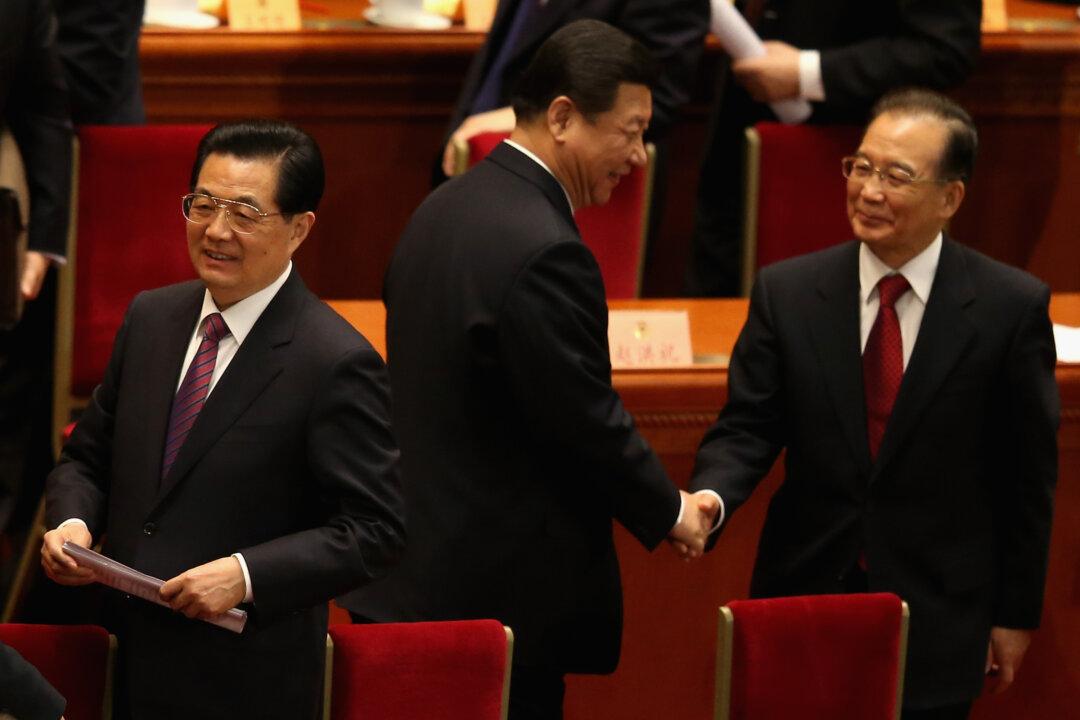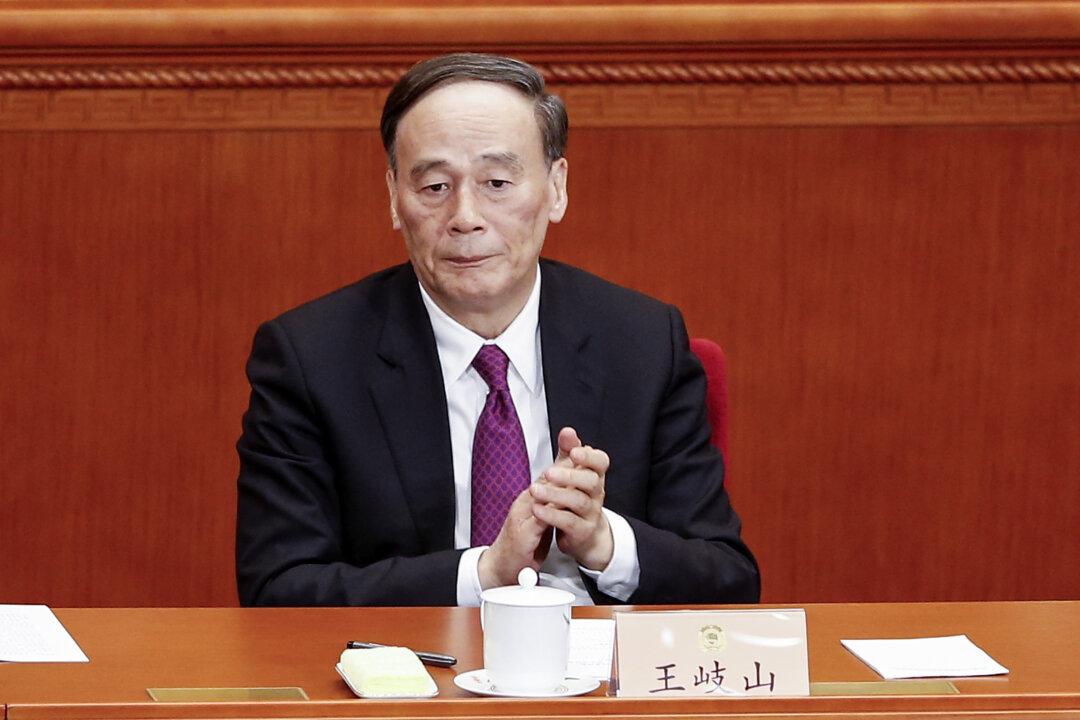News Analysis
Hu Jintao and Wen Jiabao, formerly the number one and number two officials in the Chinese regime, have largely stayed out of the media spotlight since Xi Jinping succeeded Hu as Communist Party leader in 2012.
Recently, however, the two have of a sudden become the subject of multiple reports in official and semi-official mainland and Hong Kong media outlets, coinciding with announcements by Xi about the dates of an important Party meeting in October, in which key political appointments will be negotiated.
The reappearance of these former leaders into the public spotlight appears to be intended as an endorsement of the serving Chinese leader and his political objectives, especially given the traditional role that “elders,” or retired leaders, play in Chinese politics. Xi also appears to have reciprocated Hu and Wen’s gesture, and may have even obliquely acknowledged their alliance against former Party boss Jiang Zemin.
Common Cause
Former Party leader Hu reentered the public eye with the launch of his book, “The Selected Works of Hu Jintao,” on Sept. 20.
Mainland Chinese media heavily promoted Hu’s book—mouthpiece broadcaster China Central Television ran a three-and-a-half minute segment on the “Selected Works” a day before its release, while other state-run press carried glowing reviews by regime-backed scholars and Chinese officials.
Around the time Hu’s book was being promoted, Wen, the former Chinese premier, toured schools in central and eastern China, and three of his appearances made the press. For instance, Phoenix Television, a pro-Beijing media outlet based in Hong Kong, ran a video on Sept. 23 featuring Wen, 74, playing basketball with middle school children in Anhui Province.
Meanwhile, the semi-official Beijing Times called attention to Wen’s visit to the University of Chinese Academy of Sciences, a college ran by the regime’s premier research institute, on Sept. 27. That same day, Xi announced the start and end dates of the Sixth Plenum, a key Communist Party conclave, during a meeting of the elite Politburo. Wen’s “high-profile appearances” before the Sixth Plenum are “unusual,” wrote the Canada edition of Hong Kong-based Mingpao Daily.
By gaining public visibility now, Hu and Wen are signaling their support for kindred spirit and ally Xi, according to Li Tianxiao, a political commentator with New Tang Dynasty Television (NTD), an independent Chinese language broadcaster based in New York.
“When Hu Jintao and Wen Jiabao were in office, they were subjugated by Jiang Zemin, the former Party chief,” said Li.
Jiang in Control
Jiang had handed the top Party political office to Hu in 2002, and the regime’s top military office in 2005.
But Jiang continued to exercise direct and indirect influence through his vast political network and top allies in the Politburo Standing Committee, the elite leadership body that handles all major decisions and policies in the regime. Thus Hu’s orders “never got further than the gates of Zhongnanhai,” as overseas Chinese news outlets frequently put it.
This reading is echoed in recent scholarship.
In an essay for Phoenix Television in May, Zheng Yongnian, the director of the National University of Singapore’s East Asian Institute, describes Hu’s regime as “feudal.” This is because members of the powerful Politburo Standing Committee “often had the final say” in their respective portfolios. As a result, the arrangement gave rise to the so-called “Zhou Yongkang phenomenon,” where top officials like former security czar Zhou, General Office chief Ling Jihua and military vice chairs Xu Caihou and Guo Boxiong could be considered “Party oligarchs,” Zheng wrote.
Xi Jinping has alluded to the phenomenon described by Zheng. In a 2015 speech, Xi accused Zhou, Xu, Guo, and three other purged cadres—all known allies or associates of Jiang Zemin and his faction—of forming “cliques and cabals” to “wreck and split the Party.”
Hu Jintao also never appeared to be in full control of the military after receiving the Central Military Commission chairmanship from Jiang, according to reports in the Chinese press in recent years.
Guo Boxiong and Xu Caihou, the two former vice chairmen of the Central Military Commission, made Hu, the chair, a mere “figurehead,” according to Yang Chuncheng, a former deputy director at the Academy of Military Science, in an interview last year.
In a 2008 article for the military’s official newspaper, Chen Bingde, the former People’s Liberation Army General Staff chief, recalled reporting to “General-Secretary Hu, and the ‘Military Commission chief’” for rescue operations during the 2008 Sichuan earthquake. Overseas Chinese media commonly presume that the “Military Commission chief” that Chen never names is in fact Jiang.
Evidently familiar with this, Xi took measures to avoid the same sort of shackling, with his massive anti-corruption campaign shortly after taking office. This campaign created the opportunity to purge many officials linked or allied with Jiang. And Xi took steps last year to bring the military firmly under his command, analysts say.
The Final Push
Political commentator Li Tianxiao thinks that Hu and Wen Jiabao’s publicity drive before the Sixth Plenum, which will be held from Oct. 24 to Oct. 27, is aimed at demonstrating that they “stand firmly with Xi Jinping” on handling the issue of Jiang Zemin.
According to Xin Ziling, a retired defense official with channels to moderate voices in the Party leadership, Xi and other top leaders had “reached a consensus on the resolving of the Jiang Zemin-Zeng Qinghong problem” during an informal but important retreat in end July. Zeng Qinghong is Jiang’s longtime political enabler and spymaster.
Xi is expected to formalize an investigation into Jiang and Zeng during the Sixth Plenum, where the discipline of Party cadres, and “crucially those high-level cadres in the Central Committee, the Politburo, and the Politburo Standing Committee,” are on the agenda. “There are no restricted areas and exceptions in intra-Party supervision,” read an announcement issued after the Politburo meeting, where Xi finalized the dates of the plenum.
Xi appears to have acknowledged Hu and Wen’s endorsement and their alliance through subtle gestures of his own.
During a meeting of the Party’s Central Committee on Sept. 29 that was attended by all seven members of the Politburo Standing Committee, Xi exhorted Party members to prioritize the “study” of Hu’s “Selected Works.”
Xi seemed to have delayed the official sanctioning of Hu’s book until Chinese premier Li Keqiang, who was until recently on diplomatic missions to Canada and Cuba, was back in the country. Li, the protege of Hu, was given the honor of chairing the meeting where his mentor was lauded.

